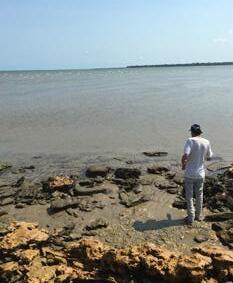
5 minute read
Cognitive assessment with Aboriginal and Torres Strait Islander peoples in the Northern Territory.
Continued from previous page acknowledged in the literature (Dingwall & Cairney, 2009; Dingwall et al., 2014).
My experience using the PRPP Assessment
Following my initial experience, I went on to work in other roles as an occupational therapist in the Northern Territory including remote disability services, providing fly-in and out services to East Arnhem Land communities and rehabilitation at Royal Darwin Hospital. In 2014, I completed the five-day training course in the Perceive, Recall, Plan and Perform Assessment (PRPP Assessment). The PRPP Assessment is a standardised, person-centred, criterion-referenced, ecologically valid, strengths-oriented assessment of applied cognition – that is, how well cognitive strategies are used to perform everyday tasks and routines. It forms part of The PRPP System of Task Analysis: Assessment and Intervention. The PRPP Assessment is administered across two stages:
Stage One: Performance Mastery (PM) – measures how well a task or routine is performed.
Stage Two: Cognitive Strategy Application (CSA) – measures the use of cognitive strategies during task performance (Chapparo & Ranka, 1997; Chapparo & Ranka, 2023a; Chapparo & Ranka, 2023b).
Administering PRPP Assessment Stage One: Performance Mastery (PM)
Prior to assessing performance, the therapist determines through interview, observation, discussion, and clinical reasoning what the person is required to do and how they usually undertake the task. The methods typically used by the person are listed as ‘steps’ on Stage One of the PRPP Assessment and completion of these steps forms the criterion against which performance is measured.
Administering PRPP Assessment Stage Two: Cognitive Strategy Application (CSA)
The PRPP Assessment Stage Two determines reasons for reduced mastery, while also identifying strengths in cognitive strategy use. An information processing model of cognition underpins this part of the PRPP Assessment Cognitive strategies assessed align with dimensions of attention, sensory perception, memory and recall, goaldirected planning, problem solving and self-evaluation, and output performance and monitoring (Chapparo et al., 2017).
Research exploring the PRPP Assessment
When using the PRPP Assessment, the flexibility in choosing the tasks assessed and the focus on how well people can use cognition to do what they needed or wanted to do seemed to fit well with what I needed to use in practice. So, following this training, I began to implement the PRPP Assessment and found this approach aligned well with the Aboriginal and Torres Strait Islander clients I worked with. I was able to acquire detailed and useful information about how cognitive function impacted occupational performance. I also had positive feedback from clients who found the assessment process relevant and engaging and the explanations I gave afterwards were easily understood. From here, I commenced a PhD part-time to explore whether the PRPP Assessment is clinically useful, valid, and whether the approach is culturally safe to assess cognition with Aboriginal and Torres Strait Islander peoples. This research is being completed across four phases.
Case stories
I began my research by looking at two case stories to explore the clinical utility of the PRPP Assessment with Aboriginal Australian peoples who had experienced acquired brain injuries (Smith et al., 2023). The case stories detail PRPP Assessment findings at three observations over a sixmonth period and demonstrate how change in cognition is measured across time.
Validity of the PRPP Assessment
Following this, I completed a validity study exploring concurrent and construct validity of the PRPP Assessment with other commonly used assessments, including the KICA. These findings are in the process of being reported.
Occupational therapist perspectives of the PRPP Assessment
Next, I completed focus groups with occupational therapists who had experience working with Aboriginal and Torres Strait Islander peoples and had also undergone PRPP training. The participants compared their experiences of completing cognitive assessments with Aboriginal and Torres Strait Islander peoples before and after completing PRPP Assessment training. The occupational therapists interviewed worked across a range of clinical areas and these findings are in the process of being reported.
Cultural safety and the PRPP Assessment
For the final phase of the study, we wanted to find out more about how the PRPP Assessment process was perceived from the perspective of the client and their family. This requires consideration of elements of cultural safety. Cultural safety uses a broad definition of culture that does not reduce it to ethnicity only. Instead, it includes a range of variables, such as age/generation, sexual orientation, socio-economic status, religious or spiritual beliefs, gender, and ability. Cultural safety considers peoples’ unique needs, and requires an ongoing process of practitioner self-reflection, cultural selfawareness, and an acknowledgement of how these factors impact on care (Williams et al., 2021). The cultural safety of health care services is typically determined by the person receiving the service but essentially begins with self-reflection by the clinician. I therefore sought ethics approval to investigate the perspectives of the client, a supportive person to the client and an occupational therapist. This proposed approach was deemed too high risk by the ethics committees reviewing the proposals and the time constraints of a PhD study required an alternative approach to be explored. Obtaining the perspectives of Aboriginal and Torres Strait Islander occupational therapists was also considered; however, the recruitment logistics and diversity in geographical areas people worked within presented a challenge as this research relates to experiences in the Northern Territory.

Perspectives of allied health professionals

The final approach selected and approved by the ethics committees was to interview allied health professionals who work with Aboriginal and Torres Strait Islander peoples in the Northern Territory. The purpose of these interviews was to explore the perspectives of allied health professionals on the key elements of cultural safety and possible tools or resources that may enhance the administration approach of the PRPP Assessment. To achieve this, simulated case scenarios were developed. An actor, (a Larrakia woman), was employed to play the part of a person with a brain injury being assessed by an occupational therapist using the PRPP Assessment. These videos were provided to the allied health professional research participants along with supplementary information to support their existing understanding of the PRPP Assessment approach. Qualitative interviews were conducted with this group where further insights into the clinical utility of the PRPP Assessment were sought. Importantly, allied health professionals were not asked to generalise their reflections but to consider how the PRPP Assessment may be used with clients they work with across a range of clinical areas. Analysis of these focus groups is currently underway.
What next?
Preliminary findings for the validity and clinical utility of the PRPP Assessment with Aboriginal and Torres Strait Islander peoples in the Northern Territory are promising. The PRPP Assessment offers a cognitive assessment approach that is strengths based, occupation embedded, performance focused and can be administered regardless of age, diagnosis, cultural mores, or language spoken and does not require literacy or numeracy skills.
About the author
Rebecca Smith
Rebecca is a PhD candidate at Charles Sturt University investigating validity, utility, and cultural safety of The Perceive, Recall, Plan and Perform (PRPP) Assessment when used with Aboriginal and Torres Strait Islander peoples in the Northern Territory. Rebecca’s PhD is supervised by Associate Professor Melissa Nott and co-supervised by Dr Judy Ranka and Dr Robyn Williams. In addition to completing a PhD Rebecca runs her own business providing OT services to children and adults in Darwin.





